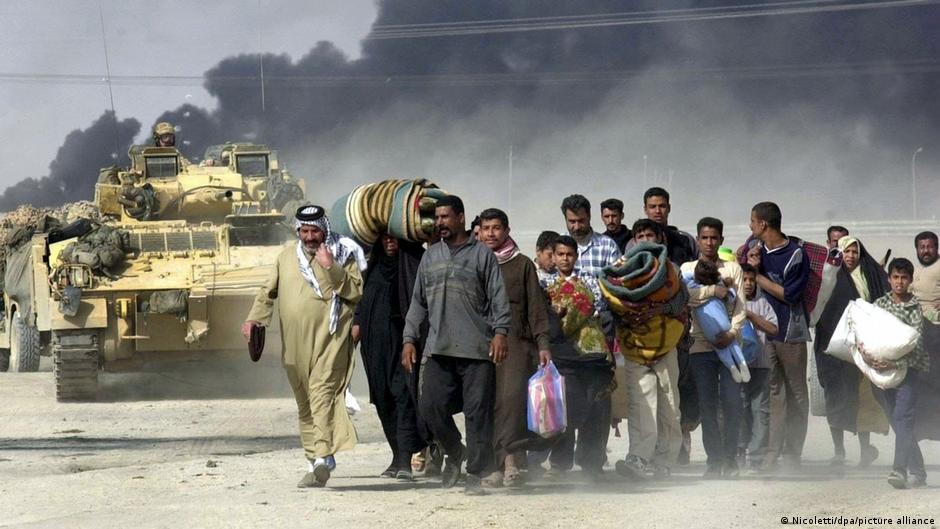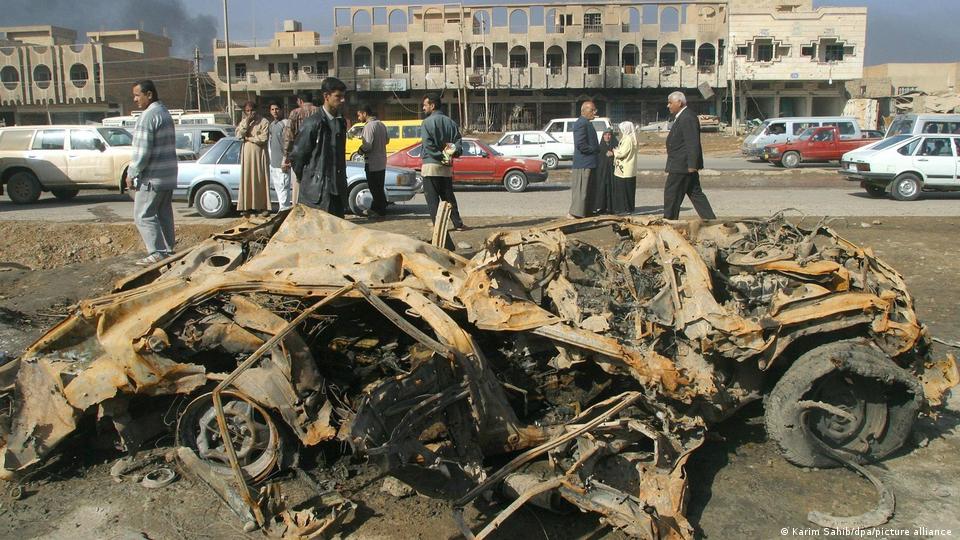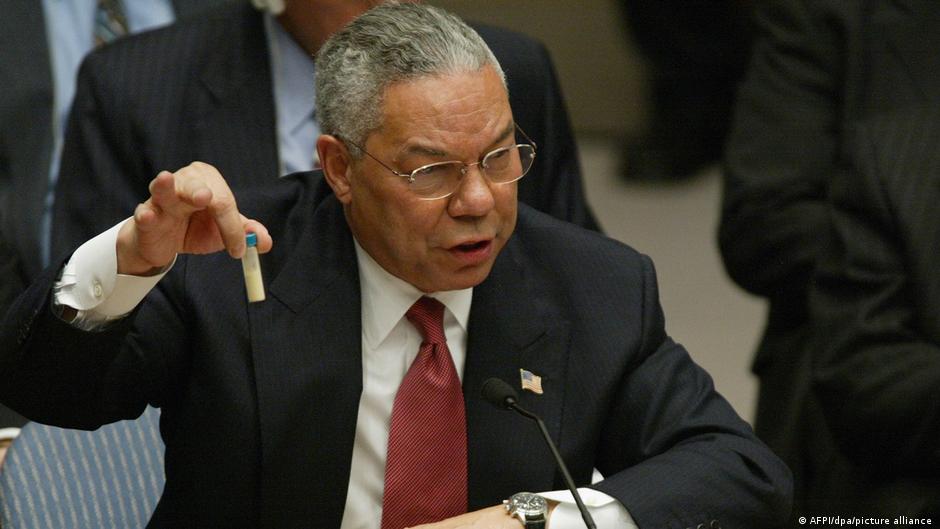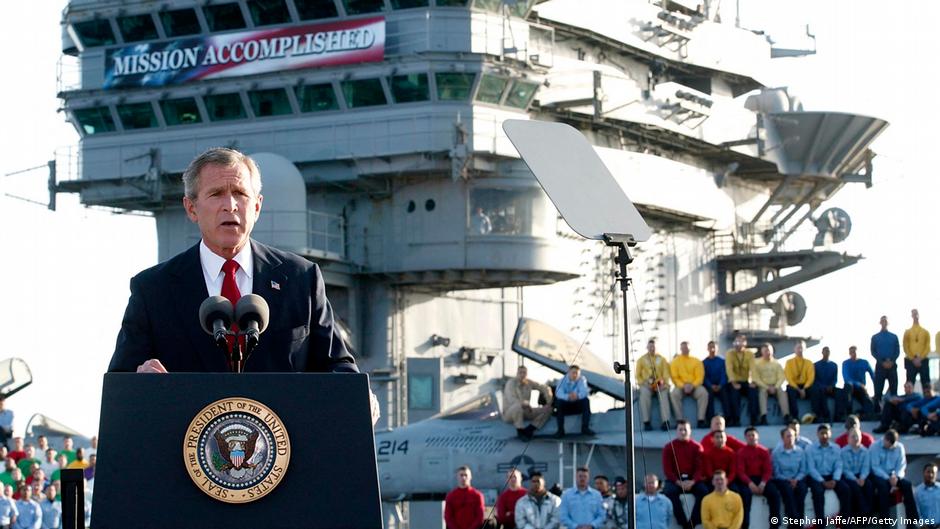Farewell to the old world order

There are some historic speeches that are later torn up by history itself. "We will accept no outcome but victory," U.S. president George W. Bush declared on the night of 20 March 2003, in a four-minute televised address during which he announced the start of the U.S. invasion of Iraq, labelled "Operation Iraqi Freedom". The Iraqis were to be "liberated" and "witness the honorable and decent spirit of the American military", he said solemnly. Bush also spoke of the "sustained commitment" required to make Iraq "a united, stable and free country".
Today, exactly two decades later, these words sound like an utter mockery to the ears of Iraqis, and to the wider Arab world. Iraq may have been liberated from the brutal autocrat Saddam Hussein with the help of the U.S. military, but today it is a disunited, unstable and unfree country par excellence.
All the stated reasons for the war later proved to be an epic web of lies, be it the supposedly acute threat from Saddam Hussein’s weapons of mass destruction, which were never found, or the Iraqi regime’s alleged link to the terrorist network al-Qaida.

An epic web of lies
But Bush himself, and his entourage of neo-cons including vice president Dick Cheney, defence secretary Donald Rumsfeld, his deputy Paul Wolfowitz and the U.S. security advisor and later foreign minister Condoleezza Rice – none of them were ever held to account. And this despite the fact that, according to information from Brown University’s "Costs of War" project (which took the trouble to calculate it), the war they were responsible for brought with it at least 275,000 deaths as a direct result of the military action.
Alongside the dead Iraqis and U.S. soldiers, the West’s credibility in the Arab world also fell victim to this war. And this loss is still having consequences two decades later. A year ago, when the Russian president Vladimir Putin sent his troops into Ukraine, Europe rightly condemned Russian aggression towards another sovereign state, but – in a display of boundless Eurocentrism – made it out to be a unique event.
And so it was no wonder that the Arab world raised its hand and clicked its fingers to remind people that two decades previously, the USA had invaded another sovereign state.
Perhaps it was George W. Bush himself who captured these parallels best, in an embarrassing Freudian slip. When the former president appeared in Dallas last May, to talk about the war in Ukraine, he spoke of Putin and "the decision of one man to launch a wholly unjustified and brutal invasion of Iraq. Whoops – I mean of Ukraine," he corrected himself with a laugh.
It was never about democracy
Whatever may have been held up as a justification for the Iraq War, it was never about bringing democracy to the country. It wasn’t about Saddam Hussein’s brutality towards his own people; the West had spent years, especially during the Iran-Iraq War (1980-1988) cooperating brilliantly with this same Saddam and supplying him with weapons.

It wasn’t about his use of poison gas against the Kurds, who were continually exploited by all sides – it was supposedly about the war on terror and weapons of mass destruction. But if it had really been about a link to the attacks on 11 September 2001, then Saudi Arabia, where 15 of the 19 attackers originated, would have been a more logical target. Leaving aside the imaginary Iraqi weapons of mass destruction.
But my purpose here is not to weigh up the Iraq War and the war in Ukraine against each other, or even to claim that one justifies the other. The USA and Europe would have more credibility in many parts of the world, however, if everything was measured with the same yardstick. And in the Arab world in particular, these double standards really do leap out at you.
The same goes for so-called western values, which were checked into the cloakroom before the invasion of Iraq. At the very latest, the publication of the ignominious photos from Iraq’s Abu Ghraib prison, which was then under U.S. military control – naked prisoners being humiliated by U.S. staff – saw an end to western values in Iraq. At that time, a host of Islam experts were quoted in the media describing what a devastating effect these images were having in the Arab world, where nudity and shame are inseparable from one another. Meanwhile, the world can offer few more humiliating photos to provide such an effective expression of the power of occupiers and the powerlessness of the occupied.
Bankrupt western values
What might be the effect of a photo showing an Arab dragging a naked German across the room on a dog lead? These were pictures that were seared into the collective Arab memory, ruining the USA’s image in the Arab world for good. Alongside many other factors, those photos also led to further radicalisation, and provided excellent PR for al-Qaida. No Bin Laden videos would ever outdo this effect.
At the time, no one had any idea that the U.S. prison camps in Iraq – such as Camp Bucca – held almost all the people who would go on to form the most senior squad of the so-called Islamic State. But here, too, the U.S. occupation of Iraq proved to be IS’s most important involuntary midwife. A good decade later, IS conquered Iraq’s third largest city, Mosul, and at times advanced to within a few kilometres of Baghdad, before being pushed back with huge international support, and eventually defeated – at least in territorial terms.
In 1990, when George W. Bush’s father, the then-U.S. president George Bush Senior, mobilised his troops for Operation Desert Storm, no one could have guessed that the stationing of U.S. troops in the Gulf would create the conditions for the Al-Qaeda terrorist network to develop, and provide it with justification for its existence. The same Al-Qaeda that, more than a decade later, was responsible for 9/11, the largest terrorist attack on American soil.
His son George W. Bush had just as little idea that his invasion and subsequent occupation of Iraq would lead to IS – an even more brutal militant Islamist organisation – seeing the light of day. At the height of its power in Iraq and Syria, it managed to control an area larger than Austria.
An argument for autocrats
But the effects of the U.S. invasion of Iraq go far beyond the genesis of IS. In the early 2000s, small democracy movements were emerging in many parts of the Arab world. Egypt, for example, had "Kefaya", the "Enough" movement that called for an end to the rule of the Egyptian dictator Hosni Mubarak. Damascus was home to salons where people dreamed of democratising the country. Small, tentative democracy seedlings were springing up, mostly sown by left-wing and liberal coalitions.
As a counter-strategy, the dictators – whether Hosni Mubarak or Bashar Al-Assad – pointed to Iraq, which had sunk into chaos after the U.S. invasion and was tearing itself apart in a civil war between Sunnis and Shias. The Arab autocrats’ argument was both simple and effective: "Is that the kind of democracy you want here?" they asked their compatriots. In Iraq, the USA had managed to discredit the idea of democracy in the minds of the Arab public as an unwanted U.S. export that led directly to chaos.
And so another eight years went by before the Arab Spring, when for the first time large numbers of people in the region took to the barricades against their autocrats. Had the Arabs not been put off by the U.S. invasion of Iraq, marketed by Washington as "bringing democracy" to the country, the 2011 Arab Spring would probably have begun several years earlier.

The beginning of the end for a world order
But the most important lesson for the USA and Europe to take from the Iraq War is that, even with the strongest military might in the world, you cannot change the balance of power in another country to suit you.
It was an unforgettable moment when George W. Bush was flown to the Abraham Lincoln aircraft carrier, where he mounted a podium in front of a banner that read "Mission Accomplished", and praised his troops by saying that this was "a job well done". He then announced to the world: "In the battle of Iraq, the United States and our allies have prevailed." Dressed in a green pilot's jumpsuit, with a white pilot helmet tucked under his arm, he saluted those present on the flight deck.
During this theatrical scene of triumph, Bush had no inkling that two decades later, U.S. troops would be largely withdrawn from Iraq due to strong Iraqi resistance. And worse still: he had no inkling that Iraq would be controlled by neighbouring Iran, which Bush had also branded a rogue state.
Today, with the support of Tehran, Shia parties and militias set the tone in Baghdad. This development is pretty much the last thing George W. Bush envisioned as a triumph, as he stood on that aircraft carrier. And in this respect, the Iraq War and its consequences were also the beginning of the end for a world order in which the USA could single-handedly determine the course of global events.
The fact that last week, Iran and Saudi Arabia – an important U.S. ally in the region – unexpectedly signed a cooperation agreement mediated by China of all countries, shows one thing above all: how quickly history marches on, once it has torn up the script that Washington wrote for Iraq and the region twenty years ago.
© Qantara.de 2023
Translated from the German by Ruth Martin
Karim El-Gawhary has worked for more than three decades as Middle East correspondent for the German taz newspaper, based in Cairo, from where he regularly travels throughout the Arab world.
